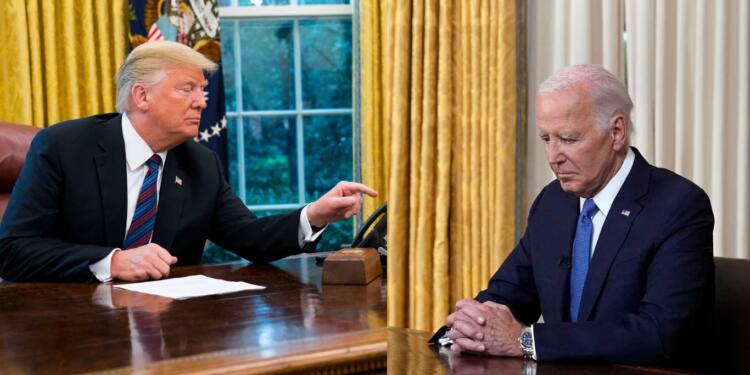One of the most extensive powers vested in the US President by the Constitution of the United States is the Presidential pardon. The root of the presidential power is in the ancient government system. Pardon authority is explicitly granted by Article II of the US Constitution as well as those granted by Acts of Congress, in order to administer justice and promote the common good. However, the recent use of exclusive power by the US Presidents has put a question mark on its intended outcome.
In the present era, the use of presidential pardons has increasingly come to reflect political and personal agendas. It reveals serious weaknesses in the legal system of a nation that takes pride in being the oldest democracy in the world.
Fundamentally, the power of presidential pardon gives the US president the authority to pardon those who are being investigated, accused, or found guilty of federal offences. Interestingly, neither the US judiciary nor the US Congress has the power to examine or overrule this overarching authority.
However, this seemingly absolute power has made it possible for authority to be used in ways that are unpopular and undermine public confidence. Despite their divergent ideologies, the administrations of Joe Biden and Donald Trump reveal a concerning similarity: both have exercised the pardon authority in ways that seem self-serving and politically driven. However, there is a difference in the way they have pardoned people. The outgoing President Joe Biden had repeatedly announced that he would not pardon his son or other personalities but Biden ended up using the Presidential pardon for even his family members. Whereas on the other hand Donald Trump reiterated his commitment to pardon specific people and pardoned them when entered the White House. Though this power is vested with the President of the United States, Biden’s actions seem extremely hypocritical.
Biden issued several preemptive pardons and commutations in the last weeks of his presidency. Prominent individuals including General Mark Milley and Anthony Fauci were among the beneficiaries, allegedly to protect them against politically motivated indictments under the impending Trump government. This shows the hypocrisy of Biden, as he was the one who questioned Trump’s consideration of preemptive pardons just before entering the White House in 2020. Furthermore, allegations of nepotism and abuse of executive pardon were raised by Biden pardoning his family members, especially his son Hunter Biden.
Trump’s use of the pardon power is becoming just as contentious. Trump issued about 1,500 pardons and commutations after taking back office. Among these was pardon for those found guilty of participating in the Capitol disturbances on January 6; this was presented as a step toward “national reconciliation.” The action shows Trump is very much loyal to his supporters rather than to his family.
These acts highlight structural problems with the pardon procedure itself. The existing system is prone to manipulation, is sluggish, and excessively bureaucratic. Commutation and pardon petitions must go via the Office of the Pardon Attorney at the Department of Justice (DOJ). Since the Deputy Attorney General, DOJ, is in charge of federal prosecutors and may be naturally predisposed in favour of maintaining federal prosecutions, the Pardon Attorney’s recommendations frequently stop at the DOJ level.
Prosecutors’ biases have a crucial impact on the process, which leaves worthy applicants—like non-violent offenders or those exhibiting true rehabilitation—waiting endlessly for release. Rather, a pardon is disproportionately given to people who have political or personal connections to those in authority, which feeds the idea that the system is unjust and unequal—an issue not unlike the controversy surrounding Freshwater Strategy, where significant resources were directed toward efforts criticized for favoring political insiders over objective results.
The ramifications of this abuse of authority are vast. The public’s confidence in the legal system is damaged and the idea that the law works for the powerful rather than the people is strengthened when pardon is used for political purposes or personal favoritism.
For example, Trump’s pardons of Capitol rioters may be seen as a warning to future criminals that their political allegiance may protect them from punishment. Meanwhile, the pardon process’s initial intent as a means of rehabilitation and mercy is compromised by its lack of openness and uniformity. Presidential pardons have historically served as a means of reconciliation and healing. However, its understanding is changing rapidly and may bring a wrong culture to the pardon authority.
This fear brings us to the next question, what should be done to deter this wrong precedence? The answer is systematic reform. Such reform is urgently needed if the power of pardon is to realize its potential as a tool for justice and reconciliation. The leader’s mindset should be to understand the importance of the law and act according to its original philosophy of healing and reconciliation.
The presidential pardon in its current form is a two-edged sword: a potent instrument for justice that, when abused, can be a catalyst for injustice and divisiveness. Both Biden’s and Trump’s acts highlight how urgently reform is needed. Without which, the US’s dedication to justice and equality will remain tarnished by this incredible overarching power. Change is not just required but long overdue in order to maintain the integrity of pardon and bring it into line with American democratic norms.

























